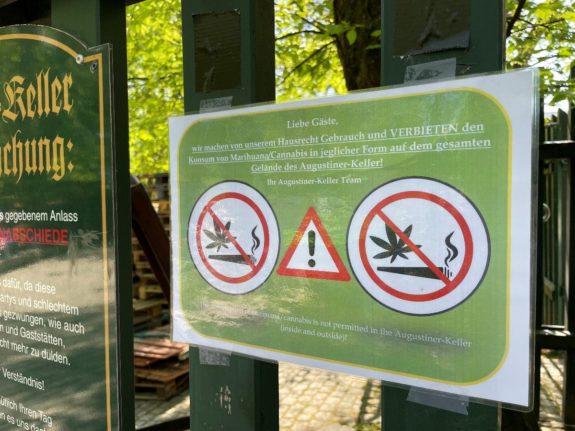The southern state of Bavaria on Tuesday announced that it wants to ban the consumption of cannabis in beer gardens, at public festivals, on restaurant terraces and in some parks.
The state government wants to “limit the public consumption of cannabis despite the federal government’s dangerous legalisation law”, according to a statement.
Clemens Baumgaertner, the head of the Oktoberfest, told the web.de news portal he specifically wants to make the festival a weed-free zone.
“A family festival like the (Oktoberfest) and cannabis consumption don’t go together,” he said.
Meanwhile, Bavaria state premier Markus Söder, of the CSU, tweeted that Bavaria was strengthening the protection of children and young people.
“We will ban smoking weed in beer gardens and at public festivals,” he said. “In addition, local authorities will be able to prohibit smoking and vaping of cannabis products in public areas where large numbers of people regularly congregate, for example at tourist attractions, outdoor swimming pools and amusement parks.”
#Bayern stärkt den Kinder- und Jugendschutz. Wir werden das Kiffen in Biergärten und auf Volksfesten verbieten. Außerdem soll den Kommunen ermöglicht werden, das Rauchen und Dampfen von #Cannabis|produkten in öffentlichen Bereichen zu untersagen, an denen sich regelmäßig viele… pic.twitter.com/Jq0QrVOM5w
— Markus Söder (@Markus_Soeder) April 16, 2024
On April 1st, Germany became the largest EU nation to legalise recreational use of cannabis, despite fierce objections from opposition politicians and medical associations.
READ ALSO: What to know about Germany’s partial legalisation of cannabis
Under the first step in the much-debated new law, adults over 18 are now allowed to carry 25 grams of dried cannabis and cultivate up to three marijuana plants at home.
However, cannabis will remain banned for under-18s and within 100 metres of schools, kindergartens and playgrounds.
The changes leave Germany with some of the most liberal cannabis laws in Europe, alongside Malta and Luxembourg, which legalised recreational use in 2021 and 2023 respectively.
But under Germany’s federal system, each state retains a degree of freedom to decide how it will impose the rules.
Bavaria plans to amend the state Health Protection Act to limit how cannabis can be legally consumed.
Politicians also plan a ban on consumption in the Englisher Garten, Hofgarten and Finanzgarten in Munich as well as the Hofgarten in Bayreuth.
The amended law is to be presented before the Whitsun holidays, which begin in mid-May this year. It is not yet clear when the law could be passed by the state parliament.
SPD legal expert in the Bavarian state parliament, Horst Arnold, criticised this approach as “cannabis hysteria”.
With reporting by Rachel Loxton




 Please whitelist us to continue reading.
Please whitelist us to continue reading.
Member comments